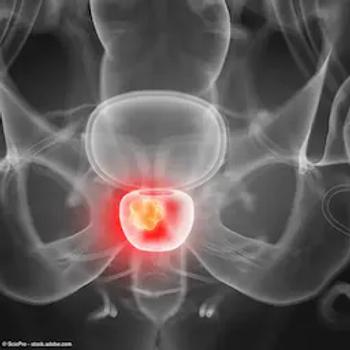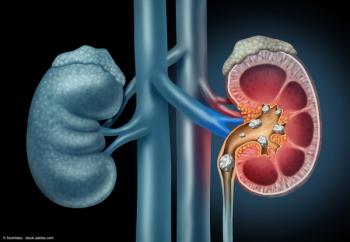
"I think a take-home message there is that in the prostate/prostate bed, you have to take extra time and caution in reading that region," says Phillip H. Kuo, MD, PhD.

"I think a take-home message there is that in the prostate/prostate bed, you have to take extra time and caution in reading that region," says Phillip H. Kuo, MD, PhD.

The European Commission must issue a decision on the application on or by June 2, 2025.

The approval is supported by results from the phase 3 NIAGARA trial.

The approval is supported by positive data from the phase 3 PSMAfore trial.

The test can deliver diagnostic results for chlamydia, gonorrhea, and trichomoniasis.

“Our results show that by using NeuroSAFE, nearly twice as many men don’t have to face potentially life-changing loss of erectile function after prostate surgery,” says Professor Greg L. Shaw.

The use of pre-diagnostic MRI was 3.8% in 2012, which increased to 32.6% in 2019.

"The striking CR rates observed in these early cohorts are highly encouraging, particularly for BCG-unresponsive NMIBC patients who currently have limited treatment options," says Paul D. Anderson, MBBS, FRACS.

"Provided that we will confirm the efficacy data long-term, there is an opportunity to spare, de-escalate a bit, the treatment in select patients, and to expose the patient with inferior risk of developing severe [adverse] effects," says Andrea Necchi, MD.

In patients with intermediate-risk disease, 4 of 5 patients demonstrated a complete response.

"I think [gepotidacin] gives a different side effect profile available to the clinicians, and I think for patients as well, it provides a better, more durable option over time," says Ryan Haumschild, PharmD, MS, MBA, CPEL.

The approval is supported by data from the phase 3 EAGLE-2 and EAGLE-3 trials.

"Now with the new translational data indicating that post-treatment close contact precautions are unnecessary, I am confident that cretostimogene will represent a breakthrough in bladder cancer treatment, if approved by the FDA," says Trinity J. Bivalacqua, MD, PhD.

The mean change in IPSS from baseline to 3 months was 12.9 in the Aquablation arm vs 13.1 in the LEP arm.

“The addition of the durvalumab did not make treatment more morbid than chemotherapy alone, and it didn't change or increase the surgical complications you saw in the ward," says James W.F. Catto, MBChB, PhD, FRCS.

“These findings reinforce isodose MHFRT as the standard of care, offering the same cancer control as conventional treatment but with fewer side effects than dose-escalated MHFRT,” says Amar U. Kishan, MD.

“Our study identifies that men who were invited for screening, but do not attend screening appointments are at significantly higher risk of dying from prostate cancer compared to men who were not offered screening or accepted an invitation for screening,” says Renée Leenen MD.

Calyxo has identified a new risk of injury when the CVAC System is used in patients with high viscosity fluid in their kidneys at the start of the procedure.

"If you determine you can invest in a volatile environment, the best approach is to do so over a period of time," writes Jeff Witz, CFP.

Gozellix – after radiolabeling with 68Ga – is indicated for PET imaging of PSMA positive lesions in men with prostate cancer who have suspected metastases and are candidates for initial definitive therapy and those who have suspected recurrence based on an elevated serum prostate-specific antigen level.

Pocenbrodib is an oral, small molecule designed to inhibit the proteins CREBBP/EP300, which activate genes that promote cancer cell growth and proliferation.

"The implication for real-world decision-making is that this drug appears to hold up to what was seen in the trial," says Mark D. Tyson II, MD, MPH.

"The positive results from this phase 3 study of the sintilimab and fruquintinib combination represent a significant advancement in the treatment of advanced renal cell carcinoma,” says Prof Zhisong He.

"These data support current AUA/SUO guidelines recommending BLC usage in patients with NMIBC to increase detection and decrease recurrence," says Stephen B. Williams, MD, MBA, MS, FACS, FACHE.

This announcement follows the successful launch of generic tiopronin delayed-release tablets last year.

The study will evaluate the investigational drug product ONC175 (orellanine) in patients with metastatic clear cell or papillary renal cell carcinoma.

“The study suggests that exercise would be an effective intervention for men with prostate cancer who express concern about sexual dysfunction, and that exercise medicine should be considered a key part of their treatment,” says Daniel Galvão, PhD.

"4 years following radiation therapy, there is a 25% lower hazard of bowel disorders and a 46% lower hazard of related procedures [in patients who received a spacer],” says Michael R. Folkert, MD, PhD.

The overall prevalence of kidney stones remained stable, with a notable increase observed among women.

"Ultimately, there is no 'right choice' when it comes to urinary diversion," writes Anne K. Schuckman, MD.